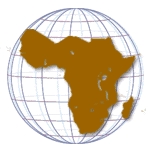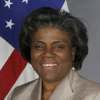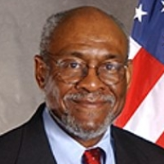Under President George W. Bush, the US became involved in negotiations to end fighting in the Sudan between government forces and the Southern People’s Liberation Movement. Bush also launched a new initiative on debt relief, including the adoption of a new policy increasing the grant content of World Bank lending to Africa’s poorest nations. Bush’s efforts to promote democracy and market-based economic growth were showcased in Benin, Tanzania and Ghana.
- More than two-thirds of sub-Saharan African countries have had democratic elections since 2000. Power has changed hands in a number of nations, from Senegal to Tanzania and from Ghana to Zambia. Over the next two to three years, the goal is to move beyond elections as the measure of freedom, and toward supporting African efforts to fortify government accountability. Through the Millennium Challenge Account (MCA), the US seeks out countries that have already implemented economic reforms and good governance programs to help transform their economies and fight poverty. Half of the countries eligible for funding under the President’s initiative are in Africa, including: Benin, Burkina Faso, Cape Verde, Ghana, Lesotho, Madagascar, Mali, Mozambique, Namibia, Senegal and Tanzania.
In September 2007, the Millennium Challenge Corporation awarded a five-year, $698 million
to the government of Tanzania to reduce poverty, stimulate economic growth and increase household incomes through targeted infrastructure investments in transport, energy and water. The Millennium Challenge Compact with Tanzania is designed specifically to address each of these constraints, including the: Transport Sector Project ($373 million), Energy Sector Project ($206 million) and Water Sector Project ($66 million). Upon project completion, it is estimated that the program will directly or indirectly benefit approximately 4.8 million Tanzanians.
- Refusal to fund effective yet “taboo” safe needle exchange programs to prevent HIV transmission among drug users
- The mandate that 1/3 of prevention spending be directed towards abstinence-only programs
- The use of only a few generic drugs as part of PEPFAR, meaning that it is much more expensive to treat people under PEPFAR than it has to be
- The creation of a market for name-brand AIDS drugs that didn't previously exist in much of the global south by purchasing patented drugs. This undermines efforts to get pharmaceutical companies to issue manufacturing licenses to generic companies or to lower the costs on their drugs in the global south.
- The requirement of numerous doctors, nurses, and other health care workers, meaning that these physicians are drawn from an already overburdened health system and are no longer able to meet the health needs they were previously meeting.
A Timely Departure (editorial, New York Times)
- Table of Contents
- Overview
- History
- What it Does
- Where Does the Money Go
- Controversies
- Suggested Reforms
- Comments
- Leave a comment


The next head of the State Department Bureau of African Affairs, which handles relations with 49 countries in sub-Saharan Africa, will be a career diplomat who has focused her career on Africa. President Barack Obama has nominated Linda Thomas-Greenfield, who has been director general of the Foreign Service and director of Human Resources since April 2012, to be the next Assistant Secretary of State for African Affairs. Assuming she is confirmed by the Senate as expected, she would succeed Johnnie Carson, a former ambassador to Kenya, Zimbabwe and Uganda, who served from 2008 to 2012.
Born in Baker, Louisiana, circa 1952, Linda Thomas-Greenfield earned a BA in Political Science at Louisiana State University in 1974 and an MA in Political Science at the University of Wisconsin in 1976.
Thomas-Greenfield taught political science at Bucknell University before joining the Foreign Service in 1982. Her first assignment came that year as a consular officer in Kingston, Jamaica. In Africa, she has served in Nigeria (for two and a half years), Gambia (for three years) and Kenya.
Her sojourn in Kenya was not without incident. After just nine months there, in 1995 she told Keith B. Richburg of The Washington Post, that her home in Nairobi had been burglarized five times. An electric fence failed to stop intruders so the local police agreed to station two officers on her grounds. But then the officers began demanding side money for their services. “I've gotten to the point where I'm more afraid not to give them money,” she said. “They're sitting outside with automatic weapons.”
In April 1994 she was sent to Rwanda on an official visit to assess refugee conditions, but two days after she arrived, the plane of Rwandan President Juvénal Habyarimana was shot down, and the Rwandan genocide broke out. Six-feet tall and black, Thomas-Greenfield was mistaken for a Tutsi. Hutu soldiers held a machine gun to her head, while she begged for her life, emphasizing her Louisiana accent: “I don't have anything to do with this. I'm not a Rwandan. I'm an American.” She then watched as the soldiers killed a Tutsi gardener. A few days later, she was allowed to leave Rwanda.
Other overseas postings have included stints in Pakistan and Switzerland, where she served at the U.S. Mission to the many UN organizations that have their headquarters there.
In Washington, Thomas-Greenfield served as a staff assistant in the Office of the Director General of the Foreign Service from 1991 to 1993; in the Bureau of Human Resources; as a deputy assistant secretary in the Bureau of Population, Refugees and Migration from 2004 to 2006; and as principal deputy assistant secretary in the Bureau of African Affairs from 2006 to 2008.
From 2008 to 2012, Thomas-Greenfield served as ambassador to Liberia. In 2005, she had led a State Department delegation that observed the Liberian national elections.
Linda Thomas-Greenfield and her husband, Lafayette, have two children, Lindsay and Lafayette II.
-Matt Bewig, David Wallechinsky
To Learn More:
Diversity Network Leadership Interview Series (by Diversity in Global Education Network)
Thomas-Greenfield Likely Choice for Assistant Secretary (by Tami Hultman and Reed Kramer, allAfrica)

A retired U.S. ambassador, Johnnie Carson spent 37 years working for the Foreign Service, mostly on assignments throughout sub-Saharan Africa. On May 6, 2009, he was confirmed as the Assistant Secretary for African Affairs.
- Latest News
- D.C. Public Schools will Teach all Second-Graders to Ride a Bike
- New Rule in Germany Limits Sales of Sex-Themed E-Books to 10pm to 6am
- What Happened to the 6-Year-Old Tibetan Boy the Chinese Government Kidnapped 20 Years Ago?
- U.S. Ambassador to Turkey Photoshops his Hair Color to Mock Turkish Mayor
- Mystery Artist Calls Attention to Unfixed Potholes by Drawing Penises around Them
Under President George W. Bush, the US became involved in negotiations to end fighting in the Sudan between government forces and the Southern People’s Liberation Movement. Bush also launched a new initiative on debt relief, including the adoption of a new policy increasing the grant content of World Bank lending to Africa’s poorest nations. Bush’s efforts to promote democracy and market-based economic growth were showcased in Benin, Tanzania and Ghana.
- More than two-thirds of sub-Saharan African countries have had democratic elections since 2000. Power has changed hands in a number of nations, from Senegal to Tanzania and from Ghana to Zambia. Over the next two to three years, the goal is to move beyond elections as the measure of freedom, and toward supporting African efforts to fortify government accountability. Through the Millennium Challenge Account (MCA), the US seeks out countries that have already implemented economic reforms and good governance programs to help transform their economies and fight poverty. Half of the countries eligible for funding under the President’s initiative are in Africa, including: Benin, Burkina Faso, Cape Verde, Ghana, Lesotho, Madagascar, Mali, Mozambique, Namibia, Senegal and Tanzania.
In September 2007, the Millennium Challenge Corporation awarded a five-year, $698 million
to the government of Tanzania to reduce poverty, stimulate economic growth and increase household incomes through targeted infrastructure investments in transport, energy and water. The Millennium Challenge Compact with Tanzania is designed specifically to address each of these constraints, including the: Transport Sector Project ($373 million), Energy Sector Project ($206 million) and Water Sector Project ($66 million). Upon project completion, it is estimated that the program will directly or indirectly benefit approximately 4.8 million Tanzanians.
- Refusal to fund effective yet “taboo” safe needle exchange programs to prevent HIV transmission among drug users
- The mandate that 1/3 of prevention spending be directed towards abstinence-only programs
- The use of only a few generic drugs as part of PEPFAR, meaning that it is much more expensive to treat people under PEPFAR than it has to be
- The creation of a market for name-brand AIDS drugs that didn't previously exist in much of the global south by purchasing patented drugs. This undermines efforts to get pharmaceutical companies to issue manufacturing licenses to generic companies or to lower the costs on their drugs in the global south.
- The requirement of numerous doctors, nurses, and other health care workers, meaning that these physicians are drawn from an already overburdened health system and are no longer able to meet the health needs they were previously meeting.
A Timely Departure (editorial, New York Times)
Comments


The next head of the State Department Bureau of African Affairs, which handles relations with 49 countries in sub-Saharan Africa, will be a career diplomat who has focused her career on Africa. President Barack Obama has nominated Linda Thomas-Greenfield, who has been director general of the Foreign Service and director of Human Resources since April 2012, to be the next Assistant Secretary of State for African Affairs. Assuming she is confirmed by the Senate as expected, she would succeed Johnnie Carson, a former ambassador to Kenya, Zimbabwe and Uganda, who served from 2008 to 2012.
Born in Baker, Louisiana, circa 1952, Linda Thomas-Greenfield earned a BA in Political Science at Louisiana State University in 1974 and an MA in Political Science at the University of Wisconsin in 1976.
Thomas-Greenfield taught political science at Bucknell University before joining the Foreign Service in 1982. Her first assignment came that year as a consular officer in Kingston, Jamaica. In Africa, she has served in Nigeria (for two and a half years), Gambia (for three years) and Kenya.
Her sojourn in Kenya was not without incident. After just nine months there, in 1995 she told Keith B. Richburg of The Washington Post, that her home in Nairobi had been burglarized five times. An electric fence failed to stop intruders so the local police agreed to station two officers on her grounds. But then the officers began demanding side money for their services. “I've gotten to the point where I'm more afraid not to give them money,” she said. “They're sitting outside with automatic weapons.”
In April 1994 she was sent to Rwanda on an official visit to assess refugee conditions, but two days after she arrived, the plane of Rwandan President Juvénal Habyarimana was shot down, and the Rwandan genocide broke out. Six-feet tall and black, Thomas-Greenfield was mistaken for a Tutsi. Hutu soldiers held a machine gun to her head, while she begged for her life, emphasizing her Louisiana accent: “I don't have anything to do with this. I'm not a Rwandan. I'm an American.” She then watched as the soldiers killed a Tutsi gardener. A few days later, she was allowed to leave Rwanda.
Other overseas postings have included stints in Pakistan and Switzerland, where she served at the U.S. Mission to the many UN organizations that have their headquarters there.
In Washington, Thomas-Greenfield served as a staff assistant in the Office of the Director General of the Foreign Service from 1991 to 1993; in the Bureau of Human Resources; as a deputy assistant secretary in the Bureau of Population, Refugees and Migration from 2004 to 2006; and as principal deputy assistant secretary in the Bureau of African Affairs from 2006 to 2008.
From 2008 to 2012, Thomas-Greenfield served as ambassador to Liberia. In 2005, she had led a State Department delegation that observed the Liberian national elections.
Linda Thomas-Greenfield and her husband, Lafayette, have two children, Lindsay and Lafayette II.
-Matt Bewig, David Wallechinsky
To Learn More:
Diversity Network Leadership Interview Series (by Diversity in Global Education Network)
Thomas-Greenfield Likely Choice for Assistant Secretary (by Tami Hultman and Reed Kramer, allAfrica)

A retired U.S. ambassador, Johnnie Carson spent 37 years working for the Foreign Service, mostly on assignments throughout sub-Saharan Africa. On May 6, 2009, he was confirmed as the Assistant Secretary for African Affairs.
- Latest News
- D.C. Public Schools will Teach all Second-Graders to Ride a Bike
- New Rule in Germany Limits Sales of Sex-Themed E-Books to 10pm to 6am
- What Happened to the 6-Year-Old Tibetan Boy the Chinese Government Kidnapped 20 Years Ago?
- U.S. Ambassador to Turkey Photoshops his Hair Color to Mock Turkish Mayor
- Mystery Artist Calls Attention to Unfixed Potholes by Drawing Penises around Them





Comments